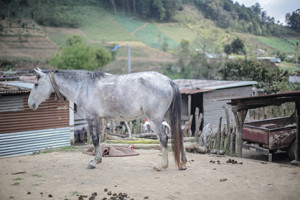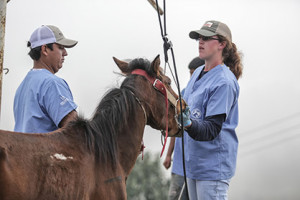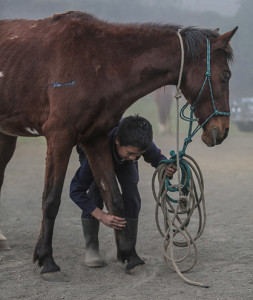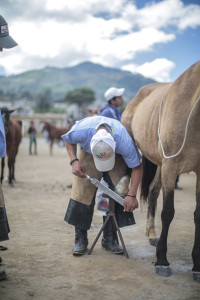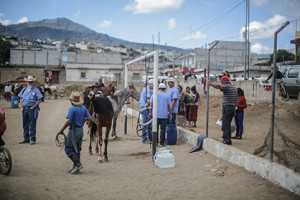Guatemalan Pack Horses Receive an Early Christmas Present
In the Central American country of Guatemala, local farmers require pack animals to help them till their soil and carry their goods to market. Most of the horses in rural Guatemala walk 20 to 30 kilometers a day, carrying firewood or crops, and help their owners earn an average of $100 to $150 US dollars per month. Veterinary care for these animals can be prohibitively expensive or non-existent.
In an effort to combat this issue, a group of equine veterinarians and veterinary students recently returned from Guatemala after volunteering for the 5th Texas Equine Veterinary Association’s Equitarian Project. Headed by Team Leader Dr. Rob Franklin, co-founder of FullBucket, they used the week of October 5 through 12, 2014 to provide immediate care for Guatemala’s working equines while introducing new procedures for wound care, farriery, and dental care to local veterinarians, veterinary students and farmers.
Supported by the TEVA, a grant from the AAEP Foundation, and with the help of donations of the attendees, FullBucket and other TEVA sponsors, the mission team saw over 150 animals in the four days spent in the country’s rural villages. “Most of the horses we saw were the little Spanish ponies typically used as pack animals in the region, though there was also a smattering of bigger horses, mares with foals at their sides, and a few stallions,” states Dr. Franklin.
With the help of a team from World Horse Welfare, a UK-based international horse charity that works to improve the lives of horses around the world through education, campaigning, and hands-on care, each horse was dewormed, inoculated against rabies, tetanus, and encephalitis, and had its ears examined for parasites. The dentistry station handled all floating when teeth abnormalities were noticed, and a farriery station took care of overlong and cracked hooves. Fecal egg counts were noted and several of the stallions were castrated.
“Teaching the people how to treat their animals and detect issues is by far the most important resource that we can offer. The main objective isn’t to make these people dependent on us coming each year, but it’s to help grow their knowledge and the local vets knowledge and to help increase their production of goods and independence,” says Franklin.
Additionally, FullBucket and its partners supported the nutritional needs of the treated horses by donating their specially formulated probiotic supplements to each working animal. Under their One-For-One program, Franklin, DVM, DACVIM, and his veterinary partner Keith Latson, DVM, DACVS, give one bucket of supplement for every FullBucket sold in the US to the needy animals seen on each Equitarian mission trip. Beginning with trips to Mexico in 2011 and 2012, FullBucket distributed over two tons of the supplements to working equids in the volcanic regions of that country.
“Finding a deeper meaning to life is a struggle for many of us. The TEVA Equitarian Project provides a lot of help to the healthcare and welfare of the working equid in Guatemala. It also improves the lives of those people who rely on these animals on a daily basis. Serving others and receiving the blessing that only service can give is like taking a bath – it requires repetition throughout life. The lives that are improved upon are worth the cost and the effort put into it,” says Dr. Franklin.
Click here to watch a video that tells more of the story.










